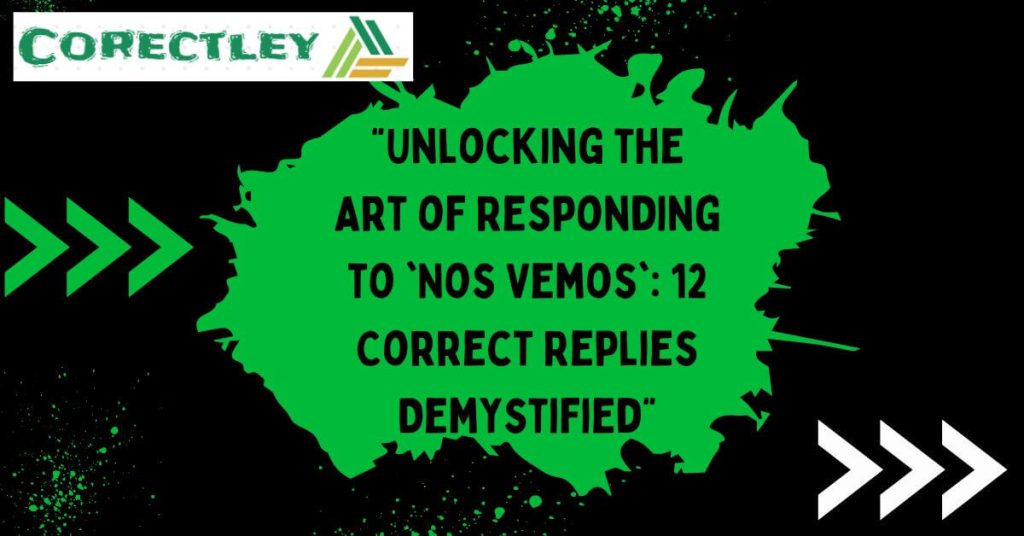Nos Vemos is a Spanish saying you might have heard from a companion. If you haven’t, it shouldn’t damage to understand what it means and how to suitably answer.

Meaning of Nos Vemos
Nos Vemos means two provisions in English:
- We see.
- We meet.
Nos Vemos as [We see]
At the point when you interpret the condition, Nos Vemos, to English, you can get [We See]. That makes no sense at all.
Nonetheless, very much like in each and every other language, the exacting interpretation of words don’t make any difference however much the message does.
At the point when you hear Nos Vemos in a Spanish sentence, it most likely means See you later. It could mean See you soon however it is generally utilized for a later time frame.
The term “soon” refers to a time that is closer to the speaking moment, whereas the term “later” refers to a time that is more distant or indefinite.
You might also be able to specify a precise but distant time thanks to the structure of the sentence. All in all, Nos Vemos might mean (See you tomorrow) or (See you one week from now).
Nos Vemos as [We meet]
The condition, Nos Vemos, can likewise be meant mean [We meet]. In right English, the message the proviso is passing is [We ought to meet] or [We will meet].
There isn’t a lot of distinction between this interpretation and the one expressed before. However, the clause might be asking you to show up at a specific location.
You will be aware in the event that you are being approached to meet at a spot. This is on the grounds that the area will be expressed.
12 Correst Responses to “Nos Vemos”
1. Nos Vemos
Nos Vemos is an approach to bidding farewell and [See you later]. It can likewise be [See you at… ..]. In these, you can answer by additionally saying [Nos Vemos].
This is like a circumstance where an person expresses [Goodbye] to you. You can constantly answer with a similar word and turn out well for you. A similar applies to [See you later] and [Nos Vemos].
If someone gives you a specific time or place where you can meet or see each other, you should just say “Nos Vemos” without repeating the time or place. This will prevent you from coming across as arrogant.
2. How long will you be out?
You might want to think about asking this kind question. Obviously, it would sound very off-kilter now and again.
This response suggests that you and the other person reside in the same area. It could be a place to stay temporarily or your own home.
This response additionally infers that you anticipate that the person should get back to that spot. Assuming it is somebody you consistently converse with, this question will show that you care about the person’s presence.
At the point when the person answers your question, you can wish the person best of luck.
On the off chance that you are not extremely near the person, posing this question might be crazy except if you have a valid justification for needing to be aware.
You ought to state why you are posing the question following inquiring.
3. Be back early
This is another question that shows that you clear. If you’re talking to someone who doesn’t care or with whom you aren’t very close, this response, like the one that was suggested earlier, might come across as quite absurd.
If you don’t live in the same city as the person you’re referring to, this response will also sound completely absurd.
The person might decide to ask as to why you want the person in question to return early and you can decide not to say why. In the event that it’s somebody you are exceptionally near, there is a high opportunity he/she will not ask as to why.
Nonetheless, in the event that it is somebody you don’t routinely relate with, this assertion will sound silly coming from you.
The person will need to know why you need him/her to return early and how you might be impacted. You can just add your explanation without ready to be asked.
4. I’m not sure about that
Does this idea sound strange to you? Perhaps it does. At the point when an person says the person in question will see you later, you may not feel the same way so you might need to consider a response unique in relation to different ideas on this rundown.
It would appear from this response that you disagree with the statement. There are two possible uses for this.
This is something you can say if you think you will see the person sooner than you thought. You can likewise say this in the event that you figure you won’t be seeing the person when expected or at any point down the road.
At the point when an person says Nos Vemos and states a specific time or spot, you can say this and add your justification for saying as much.
Your explanation needs to call attention to that you will be seeing the person significantly sooner or later than the time the person has expressed.
5. Goodbye
We previously discussed Goodbye. At the point when an person expresses Goodbye to you, a great many people don’t consider smart responses prior to exclaiming the principal word or statement that springs up to them.
Nobody passes judgment on you for that and that is on the grounds that unique responses are not normal from you.
Similar applies when an person says Nos Vemos to you. It is a splitting word. You can essentially leave.
That is a poorly conceived notion however it actually turns out great. So you don’t appear to be lighthearted and mechanical, you can essentially bid Goodbye.
Adding Yes infers that you consent to meet with the person at that point or area referenced.
6. I’ll see you around

At the point when a person says the person will see you later, you can say you will see the person around. It turns out great and can frequently have a comparable significance.
Nonetheless, Nos Vemos might make some specific memories or areas expressed and this response may not work.
Saying [See you around] may suggest that you might coincidentally find the person out of the blue while strolling around. At the point when the person says a period that you both will meet, this response will be wrong.
This response ought to work if the location referred to is already yours. A person can say Nos Vemos when the person intends to come to determine the status of you or to visit where you as of now are.
For this situation, there is a high opportunity you will coincidentally find the person when he/she comes around. Then, at that point, this response will work.
7. Give my regards
A person can remain before you and say [Nos Vemos] or [See you later]. This infers that the person is going to leave or head off to someplace else.
This proposed response is something persons say while separating. You can express this in light of Farewell however it will sound abnormal assuming there is nobody he/she is intended to give respects to.
You need to consider where the person is going or whom the person will meet. If the person is going to their home, you can advise the person to give your respects to their loved ones.
You can likewise advise the person to give your respects to your companion or somebody who might know you.
8. I will give you a call
Somebody can say [See you later] without really intending to see you later. You have most likely expressed it to somebody without knowing the in the future you will meet with the person in the future.
This response is something you can say while leaving behind somebody. Subsequently, it ought to fit as an ideal response to [Nos Vemos].
It could be someone you haven’t seen in a long time and won’t likely see again.
You can find the person by calling the person as opposed to saying you will meet later while you have no plans of doing as such.
9. Good luck
Good luck has its unique importance yet it is utilized typical to the point that it has lost its significance in a huge number. As a rule, persons simply say Good luck when they are leaving behind an person or finishing a discussion.
You can likewise express this since [Nos Vemos] closes your discussion with the person talking.
10. Ciao
The Spanish word for “good day” is It turns out both for hello while showing up and while leaving. In spite of the fact that [Nos Vemos] doesn’t have anything to do with appearance, Ciao can continuously fill in as a response while leaving.
Regardless of whether the spot and time for meeting up are expressed, Ciao will work since it would essentially be saying [Goodbye].
11. Wait a second
You will be requiring over a moment of the person’s time however this attempts to certainly stand out.
You ought to say this assuming you actually need the person’s consideration. Before the call ends, it might be over the phone. You can likewise say this in the event that the person is before you.
12. See you later
Since you can say [See you later] as a response to [See you later], you can say [Nos Vemos] as a response to [Nos Vemos]. Similarly, [See you later] can be a response to [Nos Vemos] as well as the other way around.